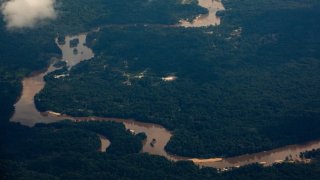
- Venezuela and Guyana have agreed not to use force or threaten one another in their long-standing dispute over a border region with enormous oil reserves.
- The two countries declared that they would "not threaten or use force against one another in any circumstances, including those consequential to any existing controversies between the two States."
- The dispute over Essequibo stretches back over a century, but tensions have flared after Venezuela claimed sovereignty over the region following a questionable referendum.
Venezuela and Guyana have agreed not to use force or threaten one another in their long-standing dispute over a border region with enormous oil reserves.
The resource-rich territory of Essequibo has been thrust into the global spotlight after Venezuela recently revived its claim to the land following a 2015 discovery of oil off the region's coast.
In a tense meeting held in St. Vincent and the Grenadines on Thursday, Venezuela President Nicolas Maduro and Guyana President Mohamed Irfaan Ali reaffirmed their commitment to "good neighborliness" and "peaceful coexistence."
Get Tri-state area news delivered to your inbox.> Sign up for NBC New York's News Headlines newsletter.
The two countries declared that they would "not threaten or use force against one another in any circumstances, including those consequential to any existing controversies between the two States."
Maduro and Ali also agreed to establish a joint commission of foreign ministers and officials to address any matters relating to Essequibo, a 61,600 square-mile region that covers most of Guyana.
Both countries said they plan to meet again in Brazil within the next three months to resolve any outstanding issues.
U.S. & World
"I am satisfied to have been face to face as I wanted it for a long time," Maduro said Friday via X, formerly known as Twitter, according to a Google translation. He thanked Guyana's Ali "for his candor and willingness to engage in broad dialogue."
"It was worth it to raise the flag of truth, to raise our historical reasons and to seek, with Bolivarian Peace Diplomacy, the path of dialogue and understanding to channel this historical controversy," Maduro said.
The Essequibo dispute
The dispute over Essequibo stretches back over a century, but tensions have flared recently after Maduro claimed sovereignty over the region following a disputed referendum.
Venezuelans on Dec. 4 approved a referendum to claim sovereignty of Essequibo, a result which sparked outcry in Guyana.
In 1899, an international arbitral tribunal awarded the territory of Essequibo to Britain, when Guyana was still under its colonial rule. Venezuela has actively disputed this ever since. Indeed, Maduro in November accused Guyana, the U.S. and oil firms of robbing Venezuela of its territory through "legal colonialism."
Guyana has maintained that the accord is legal and binding, and in 2018 sought the International Court of Justice to rule it as such.
The International Court of Justice on Dec. 1 ordered Venezuela to refrain from making any move that would change Guyana's control over Essequibo.
— CNBC's Lee Ying Shan contributed to this report.



